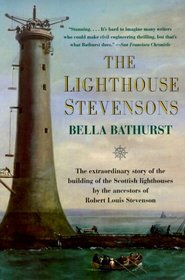Leo T. reviewed The Lighthouse Stevensons : The Extraordinary Story of the Building of the Scottish Lighthouses by the Ancestors of Robert Louis Stevenson on + 1775 more book reviews
Given that there are four generations of Stevensons, Ms. Bathurst admits she cannot hope to offer a formal biography in one thin volume. This book is easy reading, a popular history without footnotes, but only some will be interested. Likely I will send my copy to the book truck in the lobby of the VA Hospital, where there are many readers and little nonfiction on offer.
Midway through George III's long reign, Parliament decided to build lighthouses along the stormy coast of Scotland for the safety of mariners. There was bad weather and numerous 'wreckers.' The 84 major lights are now all automated as are the 112 minor lights; more of the latter are still being built. Robert Louis Stevenson earned an engineering degree but turned to travel and his pen, although he remained proud of his family's engineering achievements.
"To place a building on a rock in the Atlantic Ocean was a formidable endeavor. The pressures of wind, wave, tide, and weather on a lighthouse were exceptional. No other building, not even a harbor, had to have quite the same mixture of tenacity and flexibility as the sea towers did." Necessarily the engineering innovations are emphasized, especially the stone dove-tailed for strength (the walls were always at least nine feet thick) but there were other innovations. They included the change from coal to oil to electrical power, Fresnel's optical work and later improvements, and building on wind and water swept rock. Ms. Bathurst reminds readers that at one time horses provided motive power and there were no cranes or hydraulic equipment for lifting. There is a lot of detail about Robert Stevenson's efforts to convince his sons to obtain a practical education, such as engineering rather than the classics.
Bibliography, index.
Midway through George III's long reign, Parliament decided to build lighthouses along the stormy coast of Scotland for the safety of mariners. There was bad weather and numerous 'wreckers.' The 84 major lights are now all automated as are the 112 minor lights; more of the latter are still being built. Robert Louis Stevenson earned an engineering degree but turned to travel and his pen, although he remained proud of his family's engineering achievements.
"To place a building on a rock in the Atlantic Ocean was a formidable endeavor. The pressures of wind, wave, tide, and weather on a lighthouse were exceptional. No other building, not even a harbor, had to have quite the same mixture of tenacity and flexibility as the sea towers did." Necessarily the engineering innovations are emphasized, especially the stone dove-tailed for strength (the walls were always at least nine feet thick) but there were other innovations. They included the change from coal to oil to electrical power, Fresnel's optical work and later improvements, and building on wind and water swept rock. Ms. Bathurst reminds readers that at one time horses provided motive power and there were no cranes or hydraulic equipment for lifting. There is a lot of detail about Robert Stevenson's efforts to convince his sons to obtain a practical education, such as engineering rather than the classics.
Bibliography, index.




